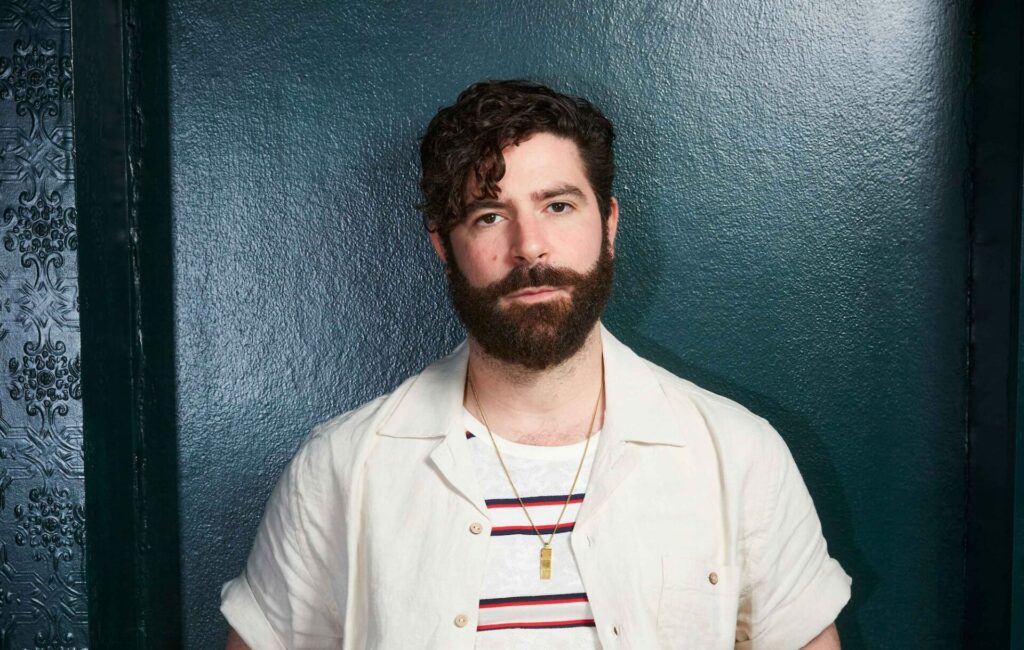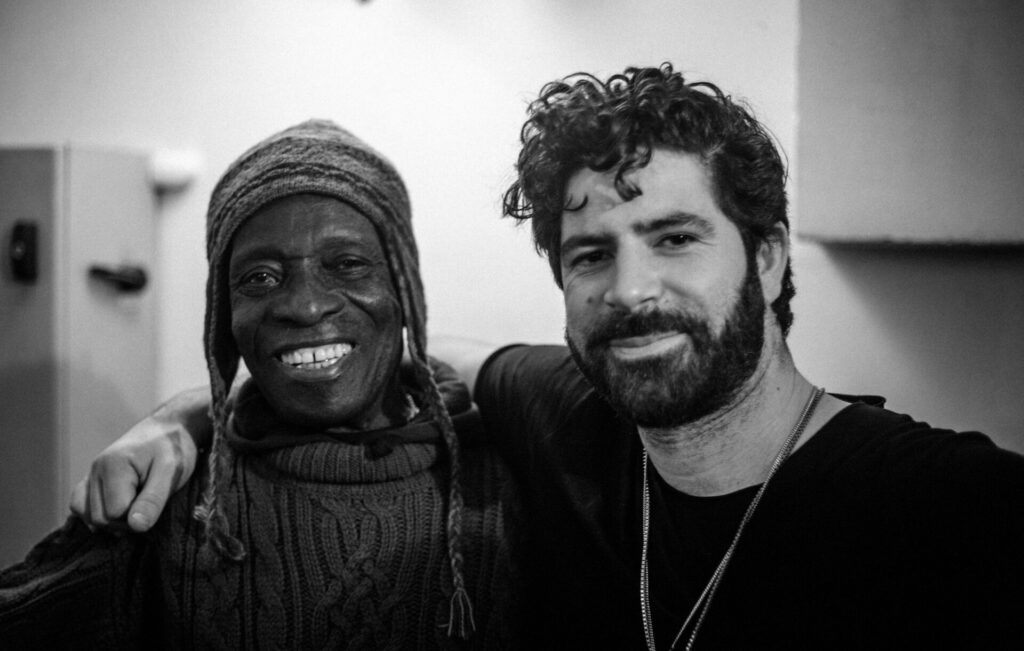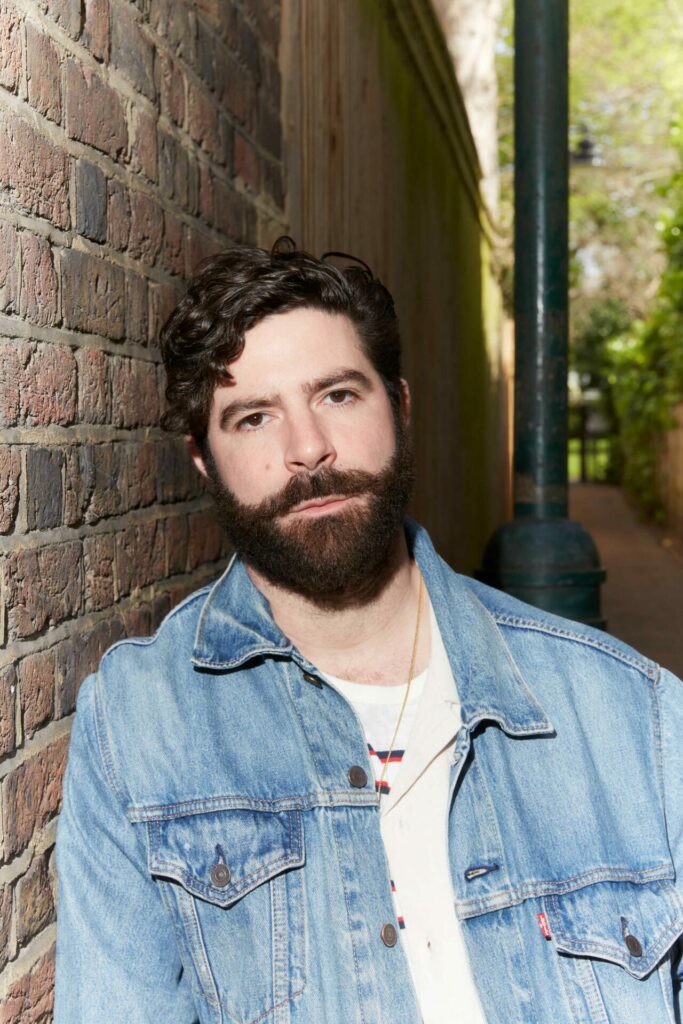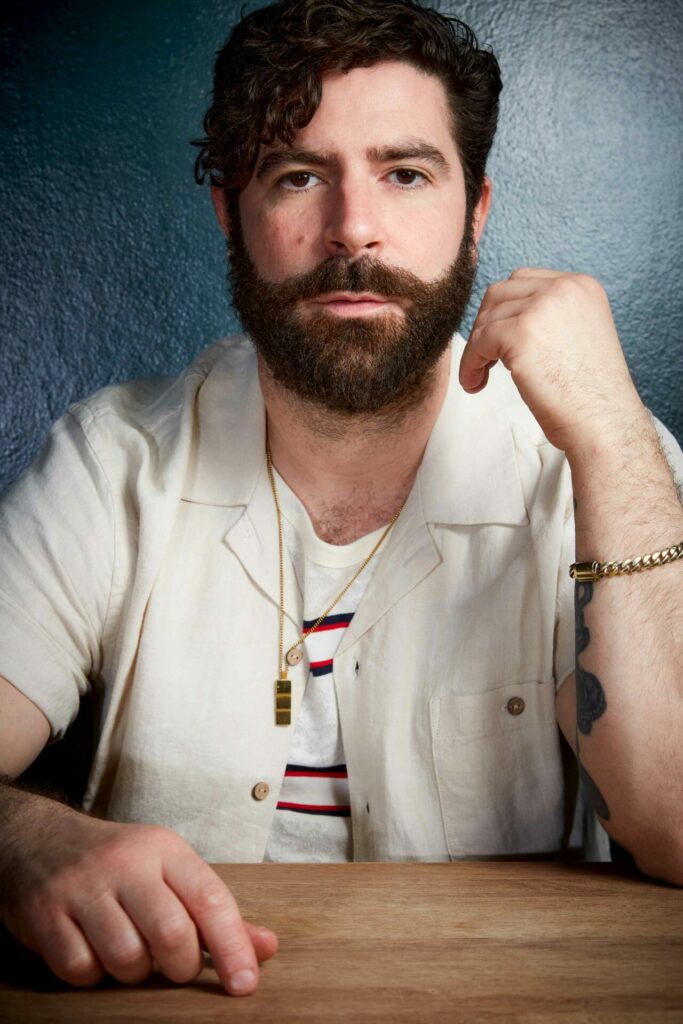Yannis & the Yaw: unfinished symphony
Foals frontman Yannis Philippakis discusses teaming up with the late, great Tony Allen for his new project, and how debut EP ‘Lagos Paris London’ honours the Afrobeat icon.

If you spoke to Yannis Philippakis over the past seven years, chances are he would have mentioned a mythical, long-rumoured collaboration with the late, great Tony Allen. “I wanted to find a way to say goodbye to him within the music. It’s what felt right to do”
“I would play the music at parties late at night,” the Foals frontman tells Rolling Stone UK from his Peckham studio, a cosy room packed full of synths and guitars that has birthed large parts of the new EP and countless Foals tracks. “My friends were sick of hearing it unfinished, but then after everything that happened… I felt a duty to finish it.”
In late 2016, Philippakis had just come off a lengthy and draining tour behind Foals’ fourth album, What Went Down, the record that solidified the Oxford band as one of the most important UK guitar acts of a generation. As soon as he stepped off the plane, the opportunity was then presented to him to collaborate with the legendary Allen, an Afrobeat icon and close collaborator of the great Fela Kuti.
“I went to Paris reluctantly because I’d been broken from this tour, and I’d done enough collaborations with people to know that it can often be quite a deflating experience that leaves you feeling quite cold,” he says. “The fact that this wasn’t the case with Tony was really, really exciting. There’s something that did just click in the room.”
The trip to Paris was framed as Philippakis being one of a group of collaborators to go and work with Allen for an album where every track was a collaboration with a different musician. “I’d be like, ‘When’s Kevin Parker coming over?’” laughs Philippakis. “But I stopped asking after a while.” The pair ended up writing three tracks on the first day they were together.
“I wasn’t really sure what would happen, and then the idea of this broader collaborative record stalled, but we were getting on well and wanted to do more,” he remembers. While the pair realised they wanted it to become a bigger project, Philippakis’ commitments with Foals and other projects stalled the pair’s progress. Then the pandemic happened, and it wrangled with Philippakis’ “fear of things remaining unfinished”, which he describes as “such a disappointing place for something to reside”.
The idea of the project remaining unfinished was then amplified by the shock death of Allen in April 2020 from an abdominal aortic aneurysm at the age of 79. “It brought a whole other barrage of emotions to deal with,” reflects Philippakis. “It felt like this music would remain a myth for a long time.”

Four years after the death of Allen, this much-teased and near-mythical music was finally announced in the form of Lagos Paris London, the debut EP from Philippakis’ new project Yannis & The Yaw. The five tracks on the EP are an irresistibly funky delight, bringing together two instantly recognisable musicians with no compromise from either.
Even before Philippakis’ one-of-a-kind vocals come in on opening track ‘Walk Through Fire’, you know it’s him through the choppy, unique guitar tones that have defined Foals since day one. Behind him, Allen’s outstanding rhythm is equally identifiable. “The way that I play the guitar is a bit of a giveaway,” laughs Philippakis. “You can hear Foals’ DNA in this music. Because of my limitations as a guitarist, I play a certain way. Then obviously Tony. Tony plays like Tony. There’s only one Tony Allen.”
Of the special and almost unexpected creative alchemy between the pair, Philippakis adds, “We’re both in the room and both dancing with each other, but there’s no necessity to dilute the intensity of each of the presences.” It’s heard on the slippery, dramatic ‘Night Green, Heavy Love’ and euphoric ‘Clementine’, the latter in particular serving as a delicious burst of pure joy.
After Allen’s death, the feelings of grief and work on another Foals album kept the collaborative music in a box only brought out to tease friends with at parties. As time went on, though, the niggling feeling of dissatisfaction at leaving this music unfinished — as well as a desire to let the world hear some of the last music Allen worked on — led Philippakis to pick the project back up.
“There had been a sense of duty to finish it anyway, but once he passed away, I realised that it really needed to be.” This sentiment was matched by a genuine excitement from the musician about what he had created with Allen. “For people who are fans of Tony’s, it’s an exciting collaboration to hear. You hear Tony Allen in a way that is different to his Afrobeat records, it’s different to the Jeff Mills stuff, it’s different to The Good, The Bad & the Queen. It’s some of the heaviest and angular stuff he’s been on.
“It was an exciting, amazing thing that happened, and nobody had got to hear it,” Philippakis says. He remembers thinking, “We should put this out, partly to celebrate how versatile and amazing Tony is, but also to show this strange coupling of two people you wouldn’t necessarily predict, writing from different stages of their lives and from different cultures.”

Lagos Paris London would have never been completed, according to Philippakis, without the assistance of Allen’s engineers Vincent Taeger and Vincent Taurelle, affectionately known as The Vincents. Taeger served as the musical director for a number of memorial concerts for Allen, and they both play an ongoing role in the drummer’s legacy.
After work on the music restarted following Allen’s death, the duo proved a vital connection between Philippakis and his late collaborator, as he explains. “I couldn’t have done it without them, and I wouldn’t have wanted to. They knew him intimately and acted as a bridge for me to be able to get on with Tony. I don’t even feel like he was super aware or particularly buzzed that I was there when I first arrived. I think somebody had talked to him about [Foals] in order for him to agree, but once we started playing, he started to get it.”
While the basis of the music was already laid down from Philippakis and Allen’s short time together in the Paris studio, much of the production and the mixing of the songs was still to be completed. He particularly credits The Vincents with assisting him on mixing tracks and editing Allen’s drum parts. “It felt like quite a delicate thing to do,” says Philippakis. “It needed to be done correctly and with respect, but they also simply knew how Tony would want things to sound.”
Philippakis says he didn’t feel he needed permission from The Vincents to finish and release the music — the initial ideas were brought into the studio by him — but felt a warmth and encouragement from their enthusiasm about sharing it with the world. “It made me feel like we were doing it for the correct reasons and that it was being finished in the right way,” says Philippakis.
While much of Foals’ music features emotional and autobiographical lyrics from Philippakis, he wanted to take the opportunity to present a different slant on his storytelling with this music. At first, he expected to just be playing guitar and welcoming guest vocalists, but eventually got drawn towards the mic.
“It didn’t feel like this record with Tony was the vessel for a personal, emotional kind of investigation,” reflects Philippakis. “When I had the first stab at doing the vocals with Tony there, there was definitely a dialogue between us about where the lyrics should live. It wouldn’t have felt right to be combing the detritus of my private life in these songs. There was a shared idea of where they should be.”
These conversations led to lyrics that Philippakis doesn’t consider overly political, but to be “engaging outwardly with social issues, and what it means to be somebody alive in a city, in a society, in a population”. At the time of recording, Paris was experiencing a wave of industrial action, and Philippakis remembers walking to the studio past “huge mounds of rubbish everywhere”. “You had people very elegantly trying to sway through all this trash,” he says. “The juxtaposition of those two things and trying to write a record in the midst of it made me feel like these could be the lampposts for where the lyrics should be — out of one’s own mind and in the streets.”
If one piece of introspection makes it into the album’s lyrical content, it’s in ‘Under the Strikes’, a song led by a giddy and fantastic horn line. Philippakis was finishing the track after Allen’s death and wanted the instrumentation to melt away and just leave Allen’s drums on their own “as a coda or farewell to him”.
“I once thought we had time to spare,” Philippakis sings in lyrics he wrote after the passing of his friend as those unquestionable drums continue to rumble on. “I wanted to find a way of saying goodbye to him within the music,” he says. “It’s what felt right to do.”
Yannis & the Yaw is, Philippakis is quick to point out, not the start of a solo career for the musician. What began as him working on Allen’s record ended up morphing into a more collaborative process, with Philippakis leading the songwriting. “There could have even been a world in which it would have been Foals featuring Tony Allen. It was open-ended, but quite quickly we realised it was a shared endeavour. If Tony was around now, maybe it would be called something slightly different, but it’s hard for me to know how he would have wanted it.”
Lagos Paris London exists in the world as a five-track EP, but Philippakis says the excitement and creativity was there to make an entire album with Allen. It is being released as Yannis & The Yaw as an acknowledgement of the collaborative process with Allen and The Vincents, and to leave the door open for another collaborative project under the name with different musicians.
Yaw is defined as a ‘swerve’ or ‘twist’, and Philippakis sees it as a signifier of the “orbiting collaborators” that birthed this project and will likely do so again in the future. His potential ideas for the future of the project include working with musicians from his native Greece, as well as something with Malian musicians he’s in touch with. “My listening habits in the last few years haven’t been that aligned to contemporary Western music or pop or indie music,” he explains. “I’m much more interested in learning about music from other cultures.”
The release of the collaborative EP with Allen arrives during a time that Philippakis refers to as a “fallow year” for Foals, who last released an album in 2022 with Life Is Yours. Though he yearns to return to the road at some point, he is currently gaining excitement from tending to his garden at home in south London and writing music for musicals and plays. Upcoming projects include a score for The Other Place with playwright Alexander Zeldin, who he worked with last year on theatre piece The Confessions. “I get to write really heavy, savage, melancholic, ambient pieces,” he smiles of the welcome change of pace.
For Foals, he sees their break as an opportunity to not slide into complacency and re-tread their steps. “We’ve been so productive and a victim of our own success,” he says of his band. “I find it baffling how productive we’ve been with Foals considering the touring. It’s been constantly fertile since we were 19. I am excited to do more but it’s important to have this brief inhalation and to look around and find out where we’re at.”

For now, the release of Lagos Paris London serves as the closing of a chapter in Philippakis’ creative life that has spanned a decade and is intertwined with memories, grief and joy. It’s released in memory of the incomparable Allen, a drummer and musical pioneer whose genius is written all across these five songs.
“The first people that told me the news were The Vincents,” remembers Philippakis. “It was sudden. He hadn’t been ill; it just happened in a day. Even though he was old, it was surprising.” Even more than the sudden impossibility of finishing this music and losing a dear friend, Philippakis mourned the inability to go on tour with Allen around the music’s release, something the pair discussed animatedly while writing together.
“We got on well in a gig environment. Whenever he’d play in London, I’d go and see him and we’d drink whisky,” he remembers with a smile. Philippakis will play a trio of shows in Amsterdam, Paris and London with the Yaw later this year, featuring musicians from the Lagos Paris London sessions and others from his wider creative orbit, all in service to the memory of his collaborator.
“He was a larger-than-life character,” he says of Allen. “It was galvanising in the sense that we had to finish this music. We made something beautiful and imperfect and unfinished. If anything good was going to come from this, we had to finish it.”
Taken from the August/September issue of Rolling Stone UK – you can buy it here now.
